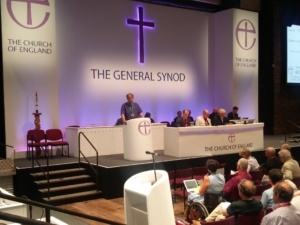Address to General Synod
2017 was BP’s biggest year of exploration since 2004. Shell boasts on its website: “We have no immediate plans to move to a net zero emissions portfolio over our investment horizon of 10-20 years”
At Shell’s annual meeting in May this year, only 5.5% of investors supported a resolution calling on the company to set emission-reduction targets in line with the Paris Agreement.
According to a 2017 report from ShareAction, Shell and BP’s ‘base case’ scenarios for business planning were both found to be ‘consistent with 3-5°C+ of global warming (source)
The world is on a trajectory to catastrophic climate change if nothing more is done. We need a much greater urgency in this debate grounded in a hope that things can change.
I sit as a member of the Advisory Board of the Oxford University Environmental Change Institute, one of the most respected global institutions for interdisciplinary study on these themes. I was asked to join the board 18 months ago in recognition of the key role that faith communities need to play in the change we need to see.
Myles Allen is Professor of Geosystem Science at the ECI and closely involved in the IPCC. Myles has argued that the most important figure in the Paris Agreement is not 1.5 or 2 degrees. The most important figure is zero: we need net zero carbon emissions to stabilise global temperatures at any level: 1.5, 2 or 3 degrees.
We potentially need to reach net zero as early as 2050 if the goals of the Paris Agreement are to be met. Any company making 40 year investments that does not have a plan for net zero by 2050 is either counting on Paris goals not being met or neglecting its duties to its shareholders.
The goal of the Paris Agreement is to see global peak carbon in 2020 and a reduction to net zero by around 2050.
Therefore the most important question to ask fossil fuel companies now is what are your plans for the reduction of carbon emissions to zero by 2050? What are measurable the staging posts along the way? How will you remain profitable through that transition?
I am sure that the period 2015-2020 (or thereabouts) is the right period for engagement. I am really grateful for all that NIB’s have done and for the Transition Pathway Initiative. The work has been outstanding. I think TPI will be needed for a long time into the future whatever the outcome of our debate today.
But there is a growing global community of churches, institutions and investors who are realising that engagement alone is not enough. Laboured and incremental change is nowhere near what is needed. Internal engagement needs to be combined with external pressure to make radical change.
We have a very serious ethical issue before us as a Church. Achieving the aims of the Paris Agreement requires 30% of oil and 50% of known gas reserves to remain unburned. If we continue to invest in these companies beyond 2020 we will be making money from practices which will harm the poorest people on earth and the planet itself.
The threat of imminent divestment beginning in 2020 is not an alternative to engagement but a vital part of that engagement. We will not be walking away. Engagement can and should continue by different means.
The Church of England has a responsibility to lead on this issue within the United Kingdom and internationally through the Anglican Communion. That moral leadership depends on aligning our investment practice and our lifestyle with the global vision for a net zero carbon world by 2050.
+Steven
8 July 2018
Further reading
- Climate change and fossil fuel investment: the facts
- Fossil fuels and the Church
- Why Christians should care for the Earth

Bishop Steven at General Synod


